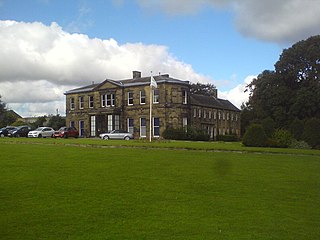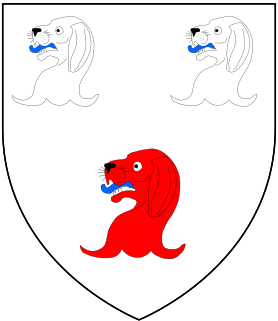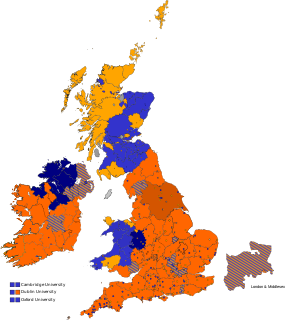Related Research Articles

Farnley Hall is a stately home in Farnley, west Leeds, West Yorkshire, England. It is a grade II listed building. It was built in Elizabethan times by the Danbys. The manor is recorded in the 1086 Domesday Book as Fernelei, so it is probable that this house was a replacement for earlier medieval structures.

Baron Feversham is a title that has been created twice, once in the Peerage of Great Britain and once in the Peerage of the United Kingdom. The first creation, in the Peerage of Great Britain, came in 1747 when Anthony Duncombe, who had earlier represented Salisbury and Downton in the House of Commons, was made Lord Feversham, Baron of Downton, in the County of Wilts. He had previously inherited half of the enormous fortune of his uncle Sir Charles Duncombe. However, Lord Feversham had no sons and the barony became extinct on his death in 1763. The peerage was revived in the Peerage of the United Kingdom in 1826 in favour of his kinsman Charles Duncombe, who was created Baron Feversham, of Duncombe Park in the County of York. He was a former Member of Parliament for Shaftesbury, Aldborough, Heytesbury and Newport. Duncombe was the grandson of Thomas Duncombe, son of John Brown by his wife Ursula Duncombe, aunt of the first Baron of the 1747 creation. Ursula had inherited the other half of her brother Sir Charles Duncombe's fortune. Lord Feversham son, the second Baron, sat as a Conservative Member of Parliament for Yorkshire and the North Riding of Yorkshire.
James Milner, 1st Baron Milner of Leeds, MC, PC, was a British Labour Party politician.

Yorkshire was a constituency of the House of Commons of the Parliament of England from 1290, then of the Parliament of Great Britain from 1707 to 1800 and of the Parliament of the United Kingdom from 1801 to 1832. It was represented by two Members of Parliament, traditionally known as Knights of the Shire, until 1826, when the county benefited from the disfranchisement of Grampound by taking an additional two members.

Flintham is an English village and civil parish in Nottinghamshire, seven miles (11.3 km) from Newark-on-Trent, opposite RAF Syerston on the A46. Its population was 597 at the 2011 Census and estimated at 586 in 2019. The Ham class minesweeper HMS Flintham was named after the village.

Winestead is a village in the East Riding of Yorkshire, England, in an area known as Holderness. It is situated approximately 7 miles (11 km) south-east of the town of Hedon and 1.5 miles (2.4 km) north-west of the village of Patrington. It is situated to the north of the A1033 road. It forms part of the civil parish of Patrington.
Sir Robert Hildyard, 2nd Baronet, of Patrington and Winestead in the East Riding of Yorkshire, was an English landowner and Member of Parliament.
Christopher Topham, member of Parliament for York, was the son of York merchant and Sheriff for the city of York Christopher Topham and his wife Ann, a daughter of Percival Levett, merchant of York and also formerly a Sheriff for the city of York. Topham was married to Susan Micklethwait, daughter of Elias Micklethwait, York merchant and member of Parliament as well as twice the mayor of York.
The Hildyard Baronetcy, of Patrington in the County of York, was a title in the Baronetage of England. It was created on 25 June 1660 for Robert Hilyard, of Patrington and Winestead. The ancient Hildyard family is thought to have been of Norman origin. Robert Hildyard served as Gentleman of the Bedchamber to King Charles I of England and was a major-general in the King's army during the English Civil War. He took part in the Battle of Marston Moor. He was raised to a baronetcy by Charles II following the Restoration of the Monarchy. He was succeeded by his grandson Sir Robert Hildyard, 2nd Baronet, a Member of Parliament for Hedon. He was succeeded by his nephew, the third Baronet, who was Member of Parliament for Great Bedwyn. The latter's son, the fourth Baronet, was High Sheriff of Yorkshire in 1783. On his death in 1814 the baronetcy became extinct.

Grantley Hall is a Country house located in North Yorkshire, England. It is situated near Grantley, about 5 miles (8 km) to the west of Ripon, on the banks of the River Skell. It is listed Grade II* on the National Heritage List for England, and the Japanese garden at the hall is listed Grade II on the Register of Historic Parks and Gardens.

Briggs Priestley was an English cloth manufacturer and Liberal Party politician from Bradford in West Yorkshire.

George Leeman was a lawyer, railwayman and a Liberal Member of Parliament (MP) for the City of York in the nineteenth century.

Thomas Blackborne Thoroton-Hildyard was an English Conservative Party politician who sat in the House of Commons in two periods between 1846 and 1885.
Sir Christopher Hilliard or Hildyard was an English landowner and politician who sat in the House of Commons at various times between 1589 and 1629.
Robert Shute was an English judge and politician who sat in the House of Commons from 1571 to 1581.

Sir Henry Belasyse, 1st Baronet (1555–1624) was an English politician.

Sir George Savile, 1st Baronet of Thornhill was an English politician and the lineal ancestor of the Marquesses of Halifax.
Nicholas de Selby was one of two Members Of Parliament for the constituency of York and the first recorded as such. He was elected during the reign of Edward I.
William Robinson was one of two Members of the Parliament of England for the constituency of York between 1584 and 1586 and then again between 1588 and 1593.
Robert Brooke was one of two Members of the Parliament of England for the constituency of York between 1584 and 1586 and also between 1586 and 1588.
References
- 1 2 "The History of Parliament Trust" . Retrieved 8 August 2021.
- ↑ Clay, J.W. (1899). Dugdale's Visitation of Yorkshire: Volume 3. p. 333.
- ↑ Foster, Joseph. Pedigrees of The County Families of Yorkshire (Vol II – North and East Riding). London: W.Wilfred Head. p. 168.
- ↑ Hildyard, Christopher (1719). The antiquities of York city, and the civil government thereof; with a list of all the mayors and bayliffs, lord mayors and sheriffs, from the time of King Edward the First, to this present year, 1719. Collected from the papers of Christopher Hildyard, esq., with notes and observations. G.White. pp. 82–83.